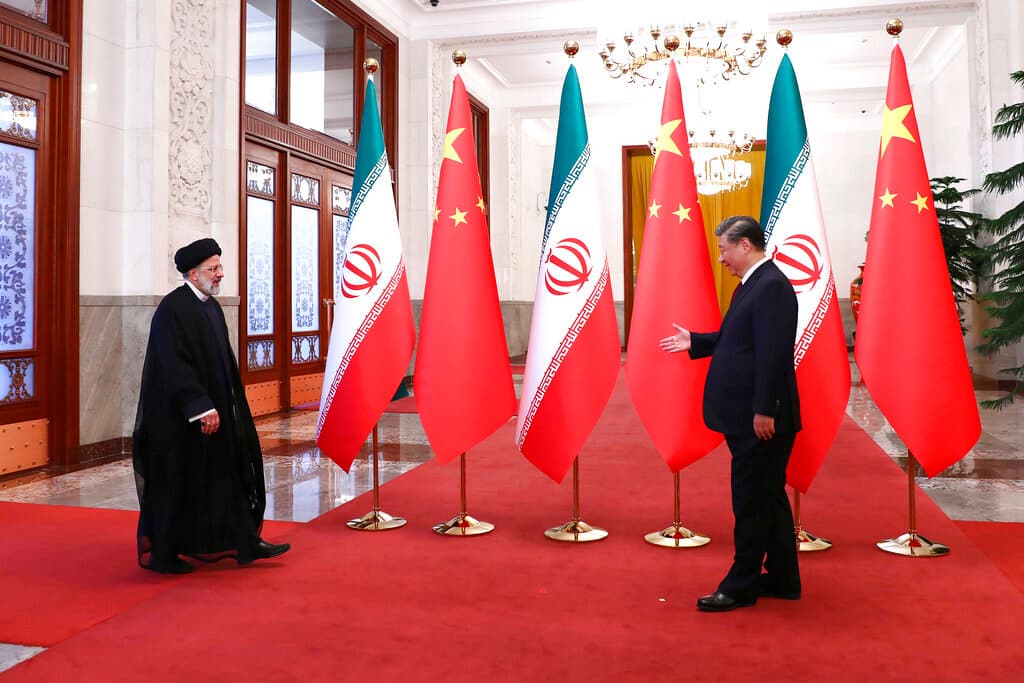Iran’s Raisi Frustrated as Beijing Plays a Double Game
Chairman Xi is trying to make the embattled Islamic Republic leader ‘feel special’ even as the Chinese pursue inroads with Saudi Arabia and the United Arab Emirates, Iranian enemies.

Feted with all the trappings of a state visit at Beijing, the Iranian president, Ebrahim Raisi, is basking in a worldly glow that increasingly eludes him at home. While Chairman Xi is hailing a “strategic partnership,” though, not all is well between the Communist behemoth and the Islamic Republic.
“No matter how the international and regional situation changes, China will unswervingly develop friendly cooperation with Iran and promote the development of the China-Iran comprehensive strategic partnership,” Mr. Xi said Tuesday, with Mr. Raisi next to him.
Yet, even as Mr. Xi vows to increase trade with Iran, Tehran is dissatisfied with the implementation of the 2021 cooperation deal it made with Beijing. The Iranians feel betrayed by Mr. Xi’s December visit to their regional rival, Saudi Arabia, and Beijing’s tightening relations with Riyadh and the United Arab Emirates.
While China purchases oil from Iran in defiance of an American embargo, it keeps a wary eye on possible secondary sanctions, and would likely limit Iranian oil consumption if Washington proved serious in imposing those measures. Beijing, at the same time, defies Western restrictions on Russian oil exports. By buying oil from Russia, Beijing aids its Kremlin allies’ Ukraine war.
Mr. Raisi betrayed some frustration with Beijing on Tuesday when, according to Tehran’s foreign ministry, he told his host that “the development of relations between Iran and China has been moving forward, but what has been done is far from what should be done, and to compensate this backwardness, we should take greater steps.”
Beijing has intended the three-day trip, the first state visit by an Iranian president in 20 years, “as a makeup,” the policy director at United Against Nuclear Iran, Jason Brodsky, told the Sun. Mr. Xi is “trying to make Raisi feel special,” he said.
“China is not investing in the Iranian economy,” Mr. Brodsky said. “The Iranians feel snubbed after Xi’s visit to Riyadh. The Chinese are playing a double game, developing relations with the Saudis and the UAE at the same time that they maintain relations with Iran.”
Tehran officials “have expressed dissatisfaction with China’s investment in Iran,” an Iran specialist at Shanghai International Studies University, Fan Hongda, told the Financial Times. “At present, the most urgent need in Iran is economic development. Therefore, the more Chinese investment the better.”
Massaging the ego of a leader who is under siege at home may be a low-cost way for Beijing to consolidate the coalition it is building to undermine a global bloc of democracies and other American allies. In addition to the Iranian regime, Mr. Xi’s coalition includes Russia, North Korea, and many countries in Latin America, Africa, and other parts of Asia.
“America’s authoritarian adversaries are drawing closer together in support of their shared quest to revise the regional balance, undermine the efficacy of the dollar, and spite America,” an Iran watcher at the Foundation for Defense of Democracies, Behnam Ben Taleblu, told the Sun.
Back at home, meanwhile, Mr. Raisi is one of the main targets of the Iranian anti-regime protest movement. A former chief of the Islamic Republic’s judiciary arm, the president was responsible for a wholesale hanging of thousands of dissidents, which earned him the nickname “the Tehran butcher.”
In a nationally televised speech Saturday to mark the 44th anniversary of the Ayatollah Khomeini-led revolution, Mr. Raisi vowed to break the protest movement. The speech was overshadowed, though, by a group called Edalat-e Ali, or Justice for Ali, which managed to hack the state-owned broadcaster, IRIB, as it carried Mr. Raisi’s address.
In the one-minute-long hacked video, a masked man called on Iranians to join a Thursday national protest rally against the regime. A voice in the background shouted, “Death to the Islamic Republic,” and “Death to Khamenei” — the regime’s supreme leader.
“The Islamic Republic, and Raisi in particular, may be looking for a win abroad to project strength back home, particularly as protests continue and the regime mustered a lackluster turnout for the 44th anniversary of their revolution,” Mr. Ben Taleblu said.
A widely despised president, Mr. Raisi, along with his boss, Mr. Khamenei, confront Iranians yearning for liberty and democracy. Their hold on power is tenuous. Yet, Communist China’s hopes of building an anti-American global coalition depend, in part, on maintaining an authoritarian regime at Tehran.
Even as cracks show between Beijing and Tehran, their alliance is real. To confront it, America would do best to tighten sanctions, punish those who violate them, and convince European allies to end their pursuit of amicable diplomacy with the Islamic Republic.

